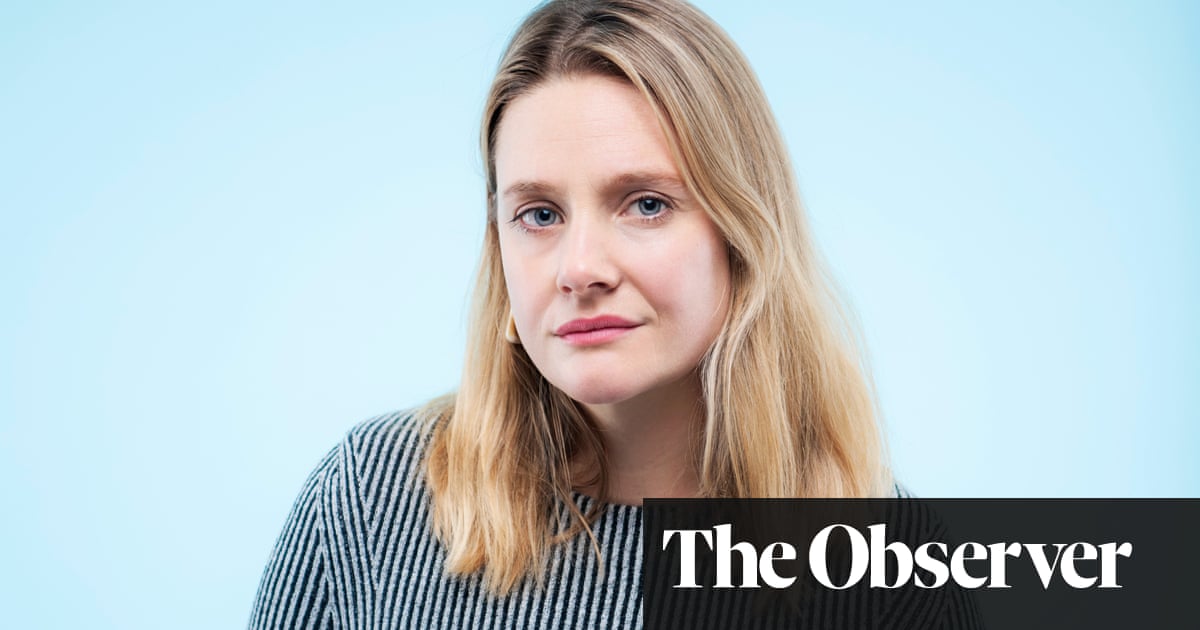
Tamara Lawrance says she has “very little desire to be pregnant” and, given the subject matter of her latest film, who can blame her? She stars in the dread-filled psychological horror Kindred as Charlotte, a young woman living in an isolated part of rural England, whose life plans go awry when she gets pregnant with her boyfriend (Edward Holcroft) and is taken into the quasi-care of his sinister family, in their crow-infested, crumbling mansion. Fiona Shaw makes for an imperious matriarch, while Jack Lowden is unnervingly obsequious as the black-sheep stepbrother.
“I really enjoyed the fact that [Charlotte] was not maternal,” says Lawrance, describing the allure of the script by writer-director Joe Marcantonio. “It’s an assumption that women are born with this innate, God-given inclination to take care of babies and there’s countless testimonies of that, but there’s also a wealth of other experience and evidence out there.” To be a woman aged anywhere between 25 and 45 is to be bombarded with images of maternal fulfilment, plus a constant stream of questions regarding one’s womb.
So Lawrance, who is soon to turn 28, appreciates the space that Kindred opens up for more ambivalent feelings. “A lot of my friends, particularly those who are creative, wonder if they want children, and are allowing themselves to ask that question. People think that people change their minds about these things, as well,” she adds. “But I think it’s OK to know that you don’t want kids.”
Charlotte’s situation – being a pregnant, Black woman who is struggling to feel welcomed by her white, aristo in-laws – echoes a well-known contemporary fable, and weirdly, this is not the first time that Lawrance has found her screen roles overlapping with the real-life experience of the Duchess of Sussex.
The Rada-trained Lawrance came to notice in National Theatre productions of Ma Rainey’s Black Bottom and Twelfth Night, while simultaneously making a splash on TV, as Prince Harry’s republican girlfriend in the BBC drama King Charles III. Originally written for the stage by Mike Bartlett, it imagined a near-future for the British royals, some of which has already come to pass. “We were shooting before the news of [Harry and Meghan] being in a relationship was even public, so I just thought that was really astute of the writer, or the casting director; to see this is a likely partnership, because of Harry’s character, perhaps.”
Neither the role in King Charles III, nor this one in Kindred were specified as Black in the script, and yet in both instances the casting of a Black actor has added a layer of nuance. In the case of Kindred, she says: “It’s not lost on me that a young Black woman being trapped inside an entirely white space throughout the whole movie and gaslit [means] there’s a lot of social commentary to be made, in terms of a broader look at Black people’s experiences within institutions.” As for whether racism plays any part in the way Charlotte is treated by her in-laws, she doesn’t feel she’s best-placed to answer. “I think that’s actually more of a question for Fiona [Shaw], and I don’t know if she’s been asked it.”
Lawrance notes, without apparent irritation, that the subjects of race and racism often come up in conversations about her work. Sometimes it’s directly relevant to the part – as when she played the enslaved-but-unbowed July, in the BBC’s 19th century Jamaica-set miniseries, The Long Song, or her role in Steve McQueen’s British Caribbean opus, Small Axe. Other times, it isn’t – as with her Cordelia opposite Ian McKellen’s King Lear, or her role in legal drama The Split. But it comes up, all the same: “I’m trying to understand that, for some people, I am a walking political body. I’ve been racialised … So I see myself as being Jamaican and I love my heritage, I love all that stuff, and I’m very, very close to my ‘blackness’, [but] I think, for the industry, as much as things have progressed and are changing, there’s still spaces where it’s just kind of all people see. And I know that Jack [Lowden] has never been asked what it’s like to be a white actor.”
Lowden and Lawrance have worked together before, on The Long Song, where he played would-be “white saviour” Robert, and she’s full of genuine appreciation for his and Shaw’s “open, collaborative” approach. Still, she pulls herself up short, midway through the actor’s pro forma paean to her co-stars: “It even annoys me that I’m saying this, because I don’t think that actors should be hyped for having humility. People go: ‘Oh, they spoke to me in the lunch break!’ It’s like, what? Shouldn’t people speak to you? We need to stop praising actors for doing basic human things! But, yeah, they are both very grounded!”
Lawrance is still relatively new to the conventions of film-making and Kindred marks an intentional step in the direction of more: “I love the way stories are told through film and I just want to get better at it. There’s an honesty that screen can catch, that I think is really mesmerising.” Next up, therefore, is a role in the ensemble cast of the British romcom Boxing Day, written and directed by I May Destroy You’s Aml Ameen, and The Silent Twins, in which she co-stars with Black Panther’s Letitia Wright. They play the troubled sisters and outsider authors Jennifer and June Gibbons. “I think they were intensely misunderstood, so I hope the film will shine a light on that scandal in the criminal justice system. Even some of my friends were like, ‘Wow, you’re playing one of those serial killers.’ And I’m like, ‘No. They didn’t kill anyone.”
Lawrance doesn’t look for projects that will make any political point, but she does spot a through-line beginning to emerge: “All the characters I’ve played, I think, were strong and resilient, no matter how they ultimately ended up … There’s something about emotionality that is frowned upon, because emotions are seen as feminine and feminine is seen as weak and subordinate.” She cuts herself off again: “Ultimately, it’s patriarchy. I’m just beating around the bush. And whether people say these things explicitly, or believe them unconsciously, we still all carry that.”
Like her characters, then, Lawrance is not inclined to fall in line with other people’s expectations. Not without first asking a few questions. “I think there can sometimes feel a pressure for a kind of individualism, like: ‘OK, I’ve just got to make it. I’ve just got to work really hard and blow through the sky and get a fat pay cheque and then be famous.’ But it’s like, one: that’s so ephemeral; and two: it’s actually kind of dangerous when people who’ve come from sometimes really adverse childhood experiences are then shot into the stratosphere and have no tools for healing.” Lawrance has a conception of the good life that’s different: “So, I kind of want to just, like, chill with my friends, innit? However long it takes, let’s just get it right.”












